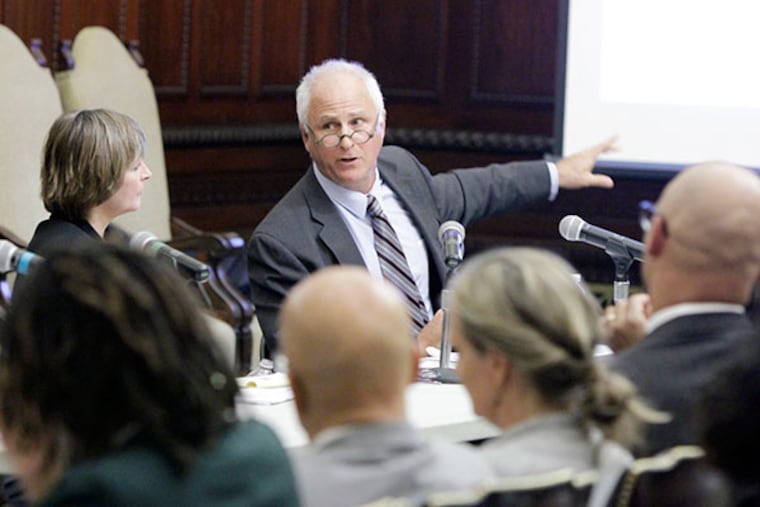Education Law Center director who fought for N.J.’s vulnerable children is stepping down after 26 years
David Sciarra has appeared before the state Supreme Court 18 times to argue groundbreaking cases on school funding, construction, and universal preschool in 31 mostly urban districts.

For 26 years, David G. Sciarra, a civil rights attorney, has been at the forefront of the fight to level the playing field for marginalized children in the landmark Abbott v. Burke rulings that helped change the educational landscape in New Jersey.
As executive director of the Education Law Center based in Newark since 1996, Sciarra has appeared before the state Supreme Court 18 times to argue groundbreaking cases on school funding, construction, and universal preschool in 31 mostly urban, special-needs districts that include Camden, Burlington City, Bridgeton, Gloucester City, Millville, and Vineland.
Beginning March 1, Sciarra will be replaced by Robert Kim, an expert in education law and policy. But Sciarra said he plans to remain active in the quest for educational equity in New Jersey and around the country.
We talked to Sciarra, who looked back on his career and the series of Abbott rulings, beginning in 1985, that required the state to boost funding to poorer districts and mandated additional resources to designated special-needs districts based on test scores and socioeconomic factors.
Why did you decide to retire now?
I recently turned 70 and it’s been 26 years. I’ve been running the Education Law Center since 1996. It’s been a lot of effort to manage the organization and handle court cases and the work. It just felt like a good time now to turn the reins over to someone else.
How did you get involved in school funding after 10 years championing causes such as affordable housing, welfare rights, and homelessness?
I’ve been a public civil rights attorney in New Jersey since 1978 [after graduating from Temple University School of Law]. In 1995, I was approached by a trustee of the Education Law Center, Lawrence Lustberg, after Marilyn Morheuser [a former nun-turned-lawyer who brought the original Abbott case] passed away. Lustberg was the chairman of the board and he needed somebody with experience arguing big cases in front of the New Jersey Supreme Court because the Abbott v. Burke litigation was at a very crucial phase. He asked me, and I said yes, and that was that.
What was going on with the Abbott v. Burke case when you became executive director?
The court had six years prior declared New Jersey’s school funding formula unconstitutional because it didn’t provide enough funding and resources for students in New Jersey’s poor, racially segregated, often-urban districts. In 1994, the court gave the state three years to come up with a new formula, the deadline being 1997. They came up with a formula that was inadequate.
What I had to do was to get the case back before the Supreme Court and argue that the second attempt by the Legislature to fix the problem was insufficient. That led to two major rulings in 1997 and 1998, which changed the educational landscape in New Jersey and beyond on school funding for low-income children, preschool, and also school-construction financing.
What has been your biggest achievement?
I would say the one that stands out is in 1998 when the Supreme Court issued the nation’s first ruling that our state guarantee of a public education must include high-quality preschool for all 3- and 4-year-olds. In other words, that public education in New Jersey has to start for poor kids in poor communities ... to close the well-documented learning gaps. The Abbott preschool program is one of the strongest, most effective, powerful reforms that we have. It serves close to 60,000 children across the state.
We’ve come a long way in making sure in places like Camden, Gloucester City, Vineland, and Millville that kids have all of the resources they need to achieve academically. We still have a ways to go.
What is on the horizon for the Education Law Center?
Our constitution of a guarantee of an education prohibits segregation in public schools. There’s a court case that is pending right now that is challenging segregated schools ... as unconstitutional. A decision in that case is expected soon. We expect that will be a catalyst for New Jersey to do something that no other state has done, which is to implement remedies, policies that will break down the intense segregation of public schools and give all students — white, Black, Latino, Asian — an opportunity to attend school in classrooms that are racially and socioeconomically diverse.
What’s next for you personally?
I’m not retiring. I’m staying in New Jersey. I’m stepping down from the Education Law Center. I don’t have any plans other than to help my successor. Then we’ll see what comes my way. As a civil rights lawyer, there’s something about clear injustice that gets me motivated. I’m still passionate about it. It’s never over.